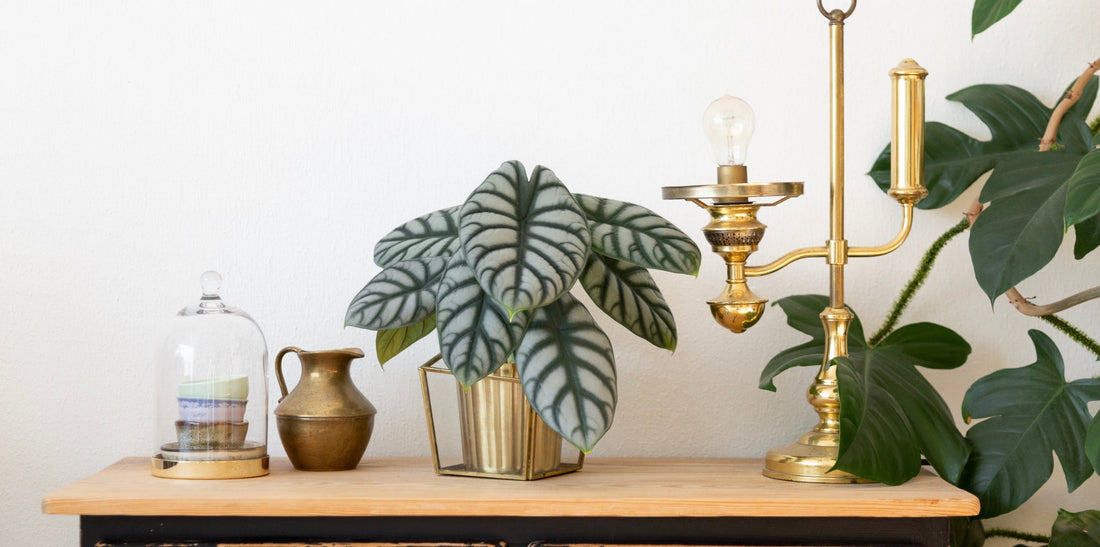Meet the Alocasia ‘Silver Dragon’
The Alocasia ‘Silver Dragon’ is a true showstopper, bringing a futuristic edge to classic tropical elegance. Its dramatic, arrow-shaped leaves flaunt a silvery sheen with bold, dark veining, making it look like it stepped right out of a modern art exhibit.
This plant isn’t just décor—it’s a living, breathing statement piece. Whether you’re looking to elevate your urban jungle or add enigmatic charm to your home, the Silver Dragon Alocasia is here to steal the spotlight (and maybe throw a little shade, too).
Benefits of Alocasia Silver Dragon
✔️ Unique, metallic foliage that adds sculptural beauty to interiors
✔️ Compact size ideal for small spaces or desktop displays
✔️ Air-purifying plant that enhances indoor air quality
Alocasia Silver Dragon Care Instructions
Light Requirements
Thrives in bright, indirect light.
Place near a window with filtered sunlight to highlight its metallic leaves. Avoid direct sun, which can scorch its delicate silver hues.
Watering Needs
Water when the top inch of soil feels dry—typically once a week, adjusting based on temperature and humidity.
Water slowly or bottom water until the soil is saturated, allowing excess water to drain out. Avoid overwatering, as soggy roots can lead to root rot. Use a moisture meter to help you if needed.
Humidity & Temperature
The Silver Dragon loves high humidity. Mist regularly or place on a pebble tray to create a mini tropical microclimate.
Ideal temperature: 65°F to 80°F (18°C to 27°C).
Avoid cold drafts and sudden temperature swings.
Soil & Potting
Use a well-draining potting mix such as coco coir blended with perlite or bark for moisture retention without waterlogging.
Choose a pot with drainage holes, and repot every 1-2 years in spring to refresh the soil and give roots room to grow.
Fertilizing Silver Dragon
Feed with a diluted balanced liquid fertilizer every 4-6 weeks during spring and summer. Avoid overfeeding to protect its elegant foliage from fertilizer burn.
Common Alocasia Silver Dragon Problems & Solutions
Yellowing Leaves:
Often a sign of overwatering or poor drainage. Adjust your watering schedule and ensure the pot drains well.
Brown Leaf Edges:
Typically caused by low humidity or inconsistent watering. Increase misting or use a humidifier to maintain lush foliage.
Pests:
Watch for spider mites and mealybugs. Treat with insecticidal soap or similar treatments if infestations appear.
Frequently Asked Questions
How often should I water my Silver Dragon?
Water when the top inch of soil feels dry—typically once a week, but adjust based on your home’s humidity and temperature.
What type of potting mix is best?
Use a coco coir-based mix with perlite or bark for excellent drainage and moisture balance.
Is Alocasia ‘Silver Dragon’ pet-friendly?
No. Like most Alocasias, it is toxic to pets if ingested. Keep it out of reach of cats and dogs.
How can I encourage robust growth?
Provide bright, indirect light, maintain consistent watering and humidity, fertilize during the growing season, and repot regularly to prevent root binding.
Final Thoughts on Silver Dragon Care
The Alocasia ‘Silver Dragon’ isn’t just another tropical plant—it’s a mystical marvel with sculptural flair. Its shimmering silver leaves bring modern elegance and dramatic charm to any indoor space.
Follow these care tips to enjoy a lush, thriving Silver Dragon Alocasia that impresses every guest with its bold personality and futuristic beauty.
Shop Alocasia Silver Dragon & More at Urbane Eight
Ready to transform your home into a modern tropical sanctuary? Explore our curated plant collection and expert care guides at Urbane Eight Greenhouse for unique plants that match your style.
👉 Shop Silver Dragon Plants Now
Let’s grow together—one bold, silvery leaf at a time.





